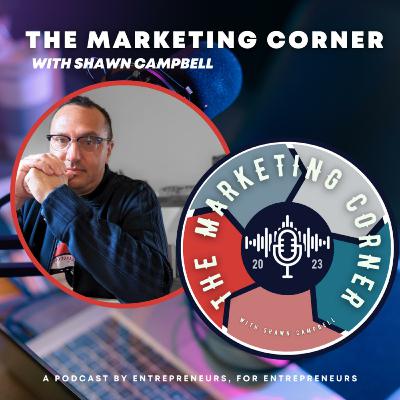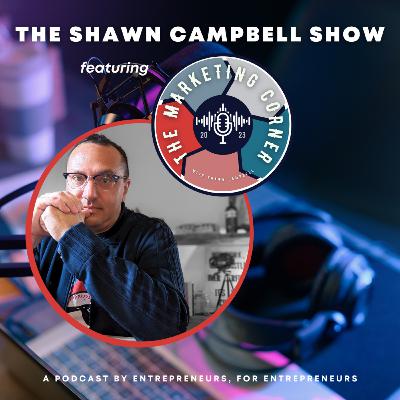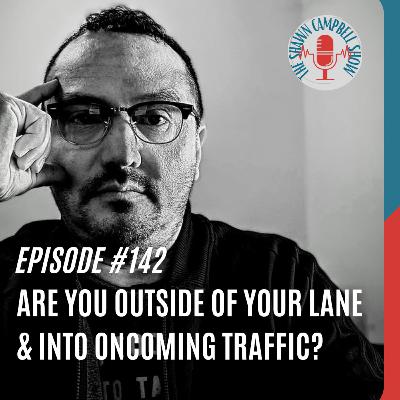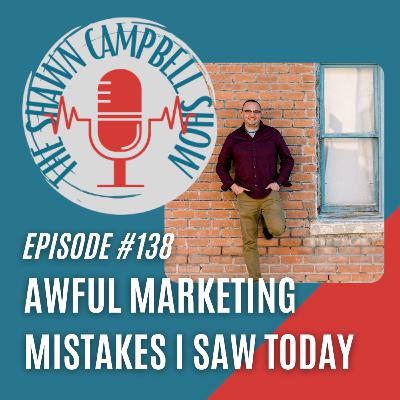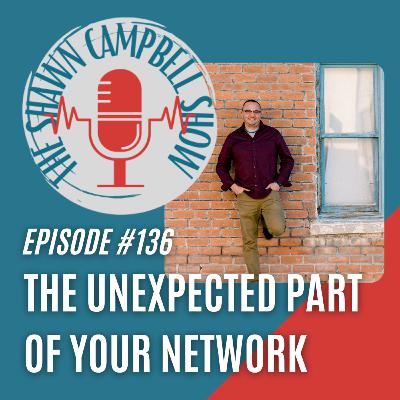Discover The Marketing Corner with Shawn Campbell
The Marketing Corner with Shawn Campbell

The Marketing Corner with Shawn Campbell
Author: Shawn Campbell | CMO
Subscribed: 0Played: 10Subscribe
Share
© Shawn Campbell | CMO
Description
Welcome to The Marketing Corner podcast which takes you on an inspiring journey through the realms of marketing strategy, business development, and entrepreneurship. Join us and our esteemed guests as we explore the secrets, strategies, and stories behind the most successful individuals and businesses in today's competitive landscape. Whether you're a seasoned entrepreneur, a marketing enthusiast, or an aspiring business leader, this podcast is your go-to resource for unlocking the keys to achievement.
233 Episodes
Reverse
In this episode, we discuss the importance of continuing your self-advancement (or education) as an entrepreneur or small business owner.
One of the most effective ways to do so is to join others in your industry and compare notes on what works well and what doesn't. However, there are some obvious limitations to this strategy.
What's something that you do to help you improve yourself and your business on a consistent basis?
In this episode, we discuss the importance of knowing how much you need to set aside for your marketing budget each year, whether you've been in business many years or if you're a start-up.
As a small business owner, it's crucial to know how to set a marketing budget. Many entrepreneurs focus solely on increasing sales, but without a clear budget, it's impossible to determine which marketing strategies are working and which ones aren't. A well-planned marketing budget helps to allocate resources and maximize returns, leading to more targeted campaigns and ultimately, greater business success.
Here are some reasons why knowing how to set a marketing budget is important for your small business:
Maximizing ROI
Every marketing campaign has a cost, and without a budget, it's impossible to know if you're getting a good return on investment (ROI). By setting a budget, you can track the cost of each campaign and determine which ones are producing the best results. This allows you to allocate more resources to successful campaigns and reduce spending on those that aren't performing as well. By maximizing your ROI, you can increase your revenue while keeping your marketing costs under control.
Staying competitive
Marketing is a critical aspect of any business, and in today's fast-paced digital world, it's essential to stay competitive. If you're not allocating enough resources to your marketing campaigns, you risk falling behind your competitors who may be investing more heavily in marketing. A budget helps you stay on top of your marketing efforts, ensuring you have the resources needed to compete in your industry.
Aligning with business goals
Your marketing budget should be aligned with your overall business goals. For example, if you're launching a new product, you'll need to invest more in marketing to raise awareness and generate sales. By setting a budget that aligns with your goals, you can ensure that your marketing efforts are targeted and effective. This will help you achieve your business objectives while staying within your budget.
Managing cash flow
Small businesses often have limited cash flow, and it's important to manage it carefully. By setting a marketing budget, you can plan ahead and ensure that you have the funds available when you need them. This allows you to avoid cash flow issues and keep your business running smoothly. A budget also helps you prioritize your marketing expenses, ensuring that you're spending money on the most critical campaigns first.
Testing new strategies
Marketing is not an exact science, and it often involves trial and error. By setting a budget, you can test new marketing strategies without risking your entire marketing budget. This allows you to experiment with new tactics and determine which ones are most effective. Over time, you can refine your marketing strategy and improve your ROI.
Building brand awareness
Building brand awareness is a critical part of any marketing strategy. By setting a budget, you can invest in campaigns that increase your brand visibility and recognition. This can include social media advertising, influencer marketing, and content marketing. By building your brand, you can increase your customer base and create more loyal customers.
Measuring success
Finally, setting a marketing budget allows you to measure the success of your campaigns. By tracking your spending and ROI, you can determine which campaigns are most effective and adjust your strategy accordingly. This ensures that you're continually improving your marketing efforts and achieving your business goals.
In conclusion, setting a marketing budget is essential for any small business owner. It allows you to maximize your ROI, stay competitive, align with your business goals, manage cash flow, test new strategies, build brand awareness, and measure success. By taking the time to plan your marketing budget, you can ensure that you're investing in the right campaigns and achieving the best possible results.
In this episode with special guests Christina Calderon and Ray Smith, they reveal their entrepreneurial "superpowers".
Entrepreneurship is a journey that requires hard work, dedication, and passion. It is not just about coming up with an idea and implementing it. It's about the long-term vision, risk-taking, and willingness to embrace uncertainty.
The journey of an entrepreneur starts with an idea. For me, that idea was to start a social media marketing agency. I saw an opportunity in the market, and I knew that I had the skills and expertise to fill that gap. But having an idea is just the beginning. The real work starts when you begin to turn that idea into a reality.
The first step for any entrepreneur is to conduct market research. You need to know your target audience, understand their needs and preferences, and identify the competition. This research will help you to refine your idea and develop a unique selling proposition.
After conducting market research, the next step is to develop a business plan. A business plan outlines the goals and objectives of the company, the target market, the strategies for growth, and the financial projections. It's important to have a clear plan in place before you start investing time and money into your business.
Once the business plan is in place, the next step is to secure funding. This can be through personal savings, loans, or investments. In my case, I opted for personal savings and loans from family and friends. It's essential to have a financial cushion to cover the initial expenses, such as website development, marketing materials, and office rent.
Once the funding is secured, it's time to start building your team. As an entrepreneur, you cannot do everything alone. You need a team of people with different skills and expertise to help you achieve your goals. For my social media marketing agency, I hired a graphic designer, a content writer, and a social media strategist.
With the team in place, the next step is to start executing your plan. This involves creating a website, developing marketing materials, and reaching out to potential clients. One of the biggest challenges for any entrepreneur is to build brand awareness and credibility. It's important to establish your presence on social media platforms and build a strong online reputation.
As you start to gain traction and win clients, it's important to keep refining your services and adapting to the changing needs of your clients. This involves continuous learning, keeping up-to-date with the latest social media trends, and experimenting with new strategies.
One of the biggest challenges I faced as an entrepreneur was managing my time effectively. With so much to do and so little time, it's essential to prioritize tasks and delegate responsibilities. It's important to focus on the tasks that are most critical to the success of your business and delegate the rest to your team members.
Another challenge I faced was managing cash flow. As a new business, it's essential to have a tight grip on your finances. You need to have a system in place to track your expenses, invoices, and payments. It's also important to have a plan in place for managing unexpected expenses and emergencies.
Despite the challenges, being an entrepreneur has been one of the most rewarding experiences of my life. It has taught me resilience, perseverance, and adaptability. It has also given me the freedom to pursue my passion and make a difference in the world.
As an entrepreneur, you have the power to create something new, solve problems, and make a positive impact on people's lives. But it's important to remember that entrepreneurship is not for everyone. It requires a high level of commitment, risk-taking, and hard work. It's important to assess your strengths and weaknesses, and be honest with yourself about your ability to handle the challenges that come with entrepreneurship.
In conclusion, the journey of an entrepreneur is a challenging b
In this episode, we have an amazing entrepreneur who has been in the game for 2+ decades, Colin Reilly, and one just starting his journey in Dante Smith, former linebacker for the University of Arizona football team! Topic of this show, the journey of the entrepreneur.
Entrepreneurship is a journey that requires hard work, dedication, and passion. It is not just about coming up with an idea and implementing it. It's about the long-term vision, risk-taking, and willingness to embrace uncertainty.
The journey of an entrepreneur starts with an idea. For me, that idea was to start a social media marketing agency. I saw an opportunity in the market, and I knew that I had the skills and expertise to fill that gap. But having an idea is just the beginning. The real work starts when you begin to turn that idea into a reality.
The first step for any entrepreneur is to conduct market research. You need to know your target audience, understand their needs and preferences, and identify the competition. This research will help you to refine your idea and develop a unique selling proposition.
After conducting market research, the next step is to develop a business plan. A business plan outlines the goals and objectives of the company, the target market, the strategies for growth, and the financial projections. It's important to have a clear plan in place before you start investing time and money into your business.
Once the business plan is in place, the next step is to secure funding. This can be through personal savings, loans, or investments. In my case, I opted for personal savings and loans from family and friends. It's essential to have a financial cushion to cover the initial expenses, such as website development, marketing materials, and office rent.
Once the funding is secured, it's time to start building your team. As an entrepreneur, you cannot do everything alone. You need a team of people with different skills and expertise to help you achieve your goals. For my social media marketing agency, I hired a graphic designer, a content writer, and a social media strategist.
With the team in place, the next step is to start executing your plan. This involves creating a website, developing marketing materials, and reaching out to potential clients. One of the biggest challenges for any entrepreneur is to build brand awareness and credibility. It's important to establish your presence on social media platforms and build a strong online reputation.
As you start to gain traction and win clients, it's important to keep refining your services and adapting to the changing needs of your clients. This involves continuous learning, keeping up-to-date with the latest social media trends, and experimenting with new strategies.
One of the biggest challenges I faced as an entrepreneur was managing my time effectively. With so much to do and so little time, it's essential to prioritize tasks and delegate responsibilities. It's important to focus on the tasks that are most critical to the success of your business and delegate the rest to your team members.
Another challenge I faced was managing cash flow. As a new business, it's essential to have a tight grip on your finances. You need to have a system in place to track your expenses, invoices, and payments. It's also important to have a plan in place for managing unexpected expenses and emergencies.
Despite the challenges, being an entrepreneur has been one of the most rewarding experiences of my life. It has taught me resilience, perseverance, and adaptability. It has also given me the freedom to pursue my passion and make a difference in the world.
As an entrepreneur, you have the power to create something new, solve problems, and make a positive impact on people's lives. But it's important to remember that entrepreneurship is not for everyone. It requires a high level of commitment, risk-taking, and hard work.
In this episode we talk about how AI has effected today's marketing strategy! Be sure to have your pen and paper handy because Wyatt Chambers from CS Design Studios sure does offer you a TON of good information that you can implement right now!
In today's fast-paced business world, it is essential for small business owners to stay on top of the latest marketing trends. Marketing trends are constantly changing, and it's crucial to stay up to date to ensure that your business stays competitive in the market. Staying on top of marketing trends can help small business owners reach their target audience more effectively. Understanding the latest marketing strategies can help businesses develop effective marketing campaigns that resonate with their audience.
For example, social media marketing is a growing trend that can help businesses reach a large audience with minimal investment. Staying on top of marketing trends can also help small business owners improve their return on investment (ROI). By adopting new marketing strategies, businesses can target their audience more effectively, resulting in better ROI.
Finally, staying on top of marketing trends can help small business owners remain competitive in the market. With the rise of e-commerce and digital marketing, businesses that fail to keep up with the latest trends risk falling behind their competitors. By adopting new marketing strategies, businesses can stay ahead of the curve and maintain a competitive edge.
This week we had a number of special guests, including Joe Zaragoza from Code 1 Maintenance. During our discussion with Joe, we talked about the importance of mindset for entrepreneurs.
Entrepreneurship is a challenging journey that requires a lot of hard work, perseverance, and resilience. One of the most critical factors that determine an entrepreneur's success is their mindset. A good mindset is essential for entrepreneurs because it shapes their thoughts, beliefs, and actions. It can determine how they approach challenges, how they respond to failures, and how they adapt to changes in the market. In this episode, we will discuss the importance of a good mindset for entrepreneurs and how it can help them achieve success.
Resilience: Entrepreneurship is full of ups and downs, and the ability to bounce back from failures and setbacks is crucial. A good mindset helps entrepreneurs develop resilience and stay focused on their goals even when things get tough. A resilient entrepreneur sees failures as opportunities to learn and grow, rather than a reason to give up. They are not deterred by obstacles and setbacks, but instead, use them as motivation to work harder.
Positive Attitude: A good mindset also means having a positive attitude towards work and life. Entrepreneurs who have a positive attitude tend to be more productive and successful. They approach challenges with a can-do attitude and are willing to take risks to achieve their goals. A positive mindset also helps entrepreneurs stay motivated during tough times and maintain a sense of optimism and hope.
Creativity and Innovation: A good mindset can also foster creativity and innovation in entrepreneurs. A creative entrepreneur can see things from a different perspective and come up with unique solutions to problems. They are not afraid to think outside the box and try new approaches. A good mindset encourages entrepreneurs to embrace their creativity and take risks to innovate and create something new.
Adaptability: The business world is constantly changing, and entrepreneurs need to be adaptable to keep up with the times. A good mindset helps entrepreneurs be more flexible and adaptable to changes in the market. They are willing to pivot their business strategies and adapt to new technologies and trends. An adaptable entrepreneur is more likely to succeed in the long run as they can stay ahead of the competition.
Focus: Entrepreneurship can be overwhelming, and it is easy to get distracted by various tasks and responsibilities. A good mindset helps entrepreneurs maintain focus and prioritize tasks effectively. They can stay on track and avoid getting sidetracked by non-essential tasks. A focused entrepreneur is more productive and can achieve their goals more efficiently.
In conclusion, a good mindset is essential for entrepreneurs who want to succeed in the business world. It helps entrepreneurs develop resilience, a positive attitude, creativity, adaptability, and focus. By cultivating a good mindset, entrepreneurs can overcome challenges and stay focused on their goals, no matter what obstacles come their way. They are more likely to succeed and achieve their dreams, and inspire others to do the same.
Things get a little crazy with very Special Guests Bill Spurbeck and Andres Ruiz as we talk about their businesses and what makes or breaks an entrepreneur in today's world - all while losing three market segments and butchering names along the way.
The Marketing Corner is a weekly radio show featured on KVOI 1030 AM in Tucson, Arizona. Listen in every Sunday at 4:00 PM as we talk everything marketing, small business, and entrepreneurship.
Special thanks to co-host, Jon McLane, host of The Common Good Radio Show and CEO of Veteran Rescue Mission.
In Episode 2 of The Marketing Corner, our guest was Ron Arenas of Picture Rocks Cooling Heating & Plumbing, and we discuss what he looks for in a new employee as well as his secrets to business networking.
The Marketing Corner is a weekly radio show featured on KVOI 1030 AM in Tucson, Arizona. Listen in every Sunday at 4:00 PM as we talk everything marketing, small business, and entrepreneurship.
Special thanks to co-host, Jon McLane, host of The Common Good Radio Show and CEO of Veteran Rescue Mission.
In this very special episode, our guest Erin Frame from Ascent Real Estate Team tells us what they look for when building a team, the importance of maintaining a strong partnership, and a little bit about what separates her team from other Realtors in Southern Arizona.
The Marketing Corner is a weekly radio show featured on KVOI 1030 AM in Tucson, Arizona. Listen in every Sunday at 4:00 PM as we talk everything marketing, small business, and entrepreneurship.
Special thanks to co-host, Jon McLane, host of The Common Good Radio Show and CEO of Veteran Rescue Mission.
In this very first episode of The Marketing Corner, a weekly radio show featured on KVOI 1030 AM in Tucson, Arizona, we have special guest, Bill Netherton give us some insight on customer service, branding, and what makes him so huggable.
Special thanks to co-host, Jon McLane, host of The Common Good Radio Show and CEO of Veteran Rescue Mission.
Good energy and good mindset brings good things.
In the beginning of this year, I was sluggish and low on my energy. And my business, frankly, mirrored that. But as I've begun to get back on my feet and back with good energy and a good mindset, things are turning around.
Coincidence?
Nope.
Do you know an entrepreneur that may simply be involved in too many projects? And these projects have absolutely nothing to do with one another? Staying in your lane as an entrepreneur isn't putting shackles on yourself - it's playing the game the smart way.
In this extra special episode, we bring back Guy Welsh, co-founder of Empower Financial Group, as we talk about Top Gun, ways to beat inflation a little baseball while on-site at the Arizona Sands Club.
Do you still have the same habits that made your business what it is today?
Sometimes we need to go back to the minors to regain our fundamentals.
One thing I see quite often are online programs that are being sold to aspiring entrepreneurs or business owners that promise an easy, get-rich-quick scheme that'll lead to all your aspirations, dreams and goals.
This is all 💩
Success is earned.
Learn more about my most recent experience of an program I see online to aspiring entrepreneurs that I don't agree with.
While out and about networking and at a local event, I couldn't help but notice a couple glaring mistakes two business owners made.
One is about consistency around your brand.
Another is about actually being an expert at what you say you do.
What's a mistake you've seen lately?
Is "added value" a part of your marketing vocabulary? For many small business owners, it's not. However, for the best of the best out there, added value is on the forefront of their marketing strategies.
Yes, your network should consist of those who you do business with - that being your clients and strategic partners. But, in this episode, I talk about a part of your network that you probably overlook - those who are like-minded and an outlier as you are.
Ever heard the statement, "It's not what you know, it's who you know"? Well, I heard that statement updated yesterday and this new version can, and should, shine a new light on your marketing efforts today.
A recent trade in the NBA got me thinking about personal branding. Check out how I've recently made an easy decision to keep my brand protected from a bad rap and how I think some pro athletes today are mismanaging theirs.



